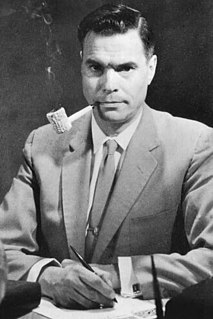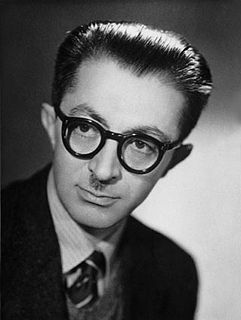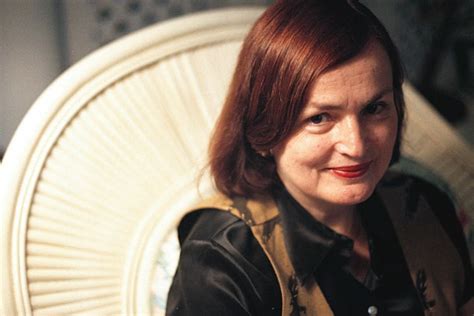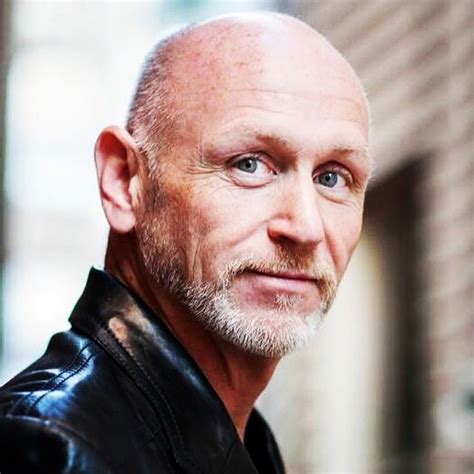A Quote by George Leonard
Running, close companion to death, summons us to the most vivid acts of life. Our ancestors (we have forgotten) ran for food and for love, love and lust. For us, a prime symbol of sexuality is the automobile. For the ancients it was the chase, the foot race. Satyr and nymph, maiden and god, hot pursuit. The mythic hunters, Diana and Atalanta, available only to the males, men or gods, who could outrun them; death to all others.
Related Quotes
How is it that we do not die of love in seeing that God Himself could do no more than shed His divine blood for us drop by drop? When as man He was preparing for death, He made Himself our food in order to give us life. God becomes food, bread for his creatures. Is this not enough to make us die of love?
If we are to be the last of the White men who conquered the world; if we are finally to be overwhelmed by a pack of rats, let us at least face the death of our race as our ancestors faced their death - like man. Let us not crawl down amongst the rats begging for mercy or trying to out-sneak them and pretend to be rats ourselves!
There are two gods. The god our teachers teach us about, and the God who teaches us. The god about whom people usually talk, and the God who talks to us. The god we learn to fear, and the God who speaks to us of mercy. The god who is somewhere up on high, and the God who is here in our daily lives. The god who demands punishment, and the God who forgives us our trespasses. The god who threatens us with the torments of Hell, and the God who shows us the true path.
There are two gods. A god who casts us off because of our sins, and a God who calls to us with His love.
Love is a dangerous thing. It comes in disguise to change our life... Lust is the deceiver. Lust wrenches our lives until nothing matters except the one we think we love, and under that deceptive spell we kill for them, give all for them, and then, when we have what we have wanted, we discover that it is all an illusion and nothing is there. Lust is a voyage to nowhere, to an empty land, but some men just love such voyages and never care about the destination. Love is a voyage too, a voyage with no destination except death, but a voyage of bliss.
Death is the twin of love and mother of us all, she struggles equally for men and women and never accepts differences of caste or class. It's death that quickens us and brings us forth on sheets of love, clasped between sleep and wakefulness and barely breathing for a spell, and thus my death shall be like everybody else's death, as majestic and as pathetic as a king or a beggar's, neither more nor less.
The first thing I would like to tell you about death is that there is no bigger lie than death. And yet, death appears to be true. It not only appears to be true but also seems like the cardinal truth of life - it appears as if the whole of life is surrounded by death. Whether we forget about it, or become oblivious to it, everywhere death remains close to us. Death is even closer to us than our own shadow.
By a beautiful paradox of Divine love, God makes His Cross the very means of our salvation and our life. We have slain Him; we have nailed Him there and crucified Him; but the Love in His eternal heart could not be extinguished. He willed to give us the very life we slew; to give us the very Food we destroyed; to nourish us with the very Bread we buried, and the very Blood we poured forth. He made our very crime into a happy fault; He turned a Crucifixion into a Redemption; a Consecration into a Communion; a death into Life Everlasting
Man depends on God for all things: God depends on man for one. Without man's love God does not exist as God, only as creator, and love is the one thing no one, not even God himself, can command. It is a free gift or it is nothing. And it is most itself, most free, when it is offered in spite of suffering, of injustice, and of death . . . The justification of the injustice of the universe is not our blind acceptance of God's inexplicable will, nor our trust in God's love, his dark and incomprehensible love, for us, but our human love, notwithstanding anything, for him.
If love doesn’t triumph, it ought to. For love is the one thing we have that feels more powerful than even death; the only respite from life’s wretched absurdity. The magic of love is not that it contains all the answers, it’s that it eliminates the need for so many pressing questions. For love makes us feel like gods--and that’s what we’re really after, isn’t it?
Consider, for example, lust versus love. When we lust after someone or something, we think in terms of what they (or it) can do for us. When we love, however, our thoughts are immersed in what we can give to someone else. Giving makes us feel good, so we do it happily. But when we lust, we only want to take. When someone we love is in pain, we feel pain. When someone whom we lust is in pain, we only think in terms of what that loss or inconvenience means to us.
"God is love". His is not a sentimental, emotional kind of love but the love of the Father who is the origin of all life, the love of the Son who dies on the Cross and is raised, the love of the Spirit who renews human beings and the world. Thinking that God is love does us so much good, because it teaches us to love, to give ourselves to others as Jesus gave himself to us and walks with us. Jesus walks beside us on the road through life.
What has the Cross left in each of us? You see, it gives us a treasure that no one else can give: the certainty of the faithful love which God has for us. A love so great that it enters into our sin and forgives it, enters into our suffering and gives us the strength to bear it. It is a love which enters into death to conquer it and save us.
The love of God again makes us free, for it draws us to set a low value on those things wherein we are subject to others - our wealth, our position, our reputation, and our life - and to set a high value on those things which no man can take from us - our integrity, our righteousness, our love for all men, and our communion with God.





































